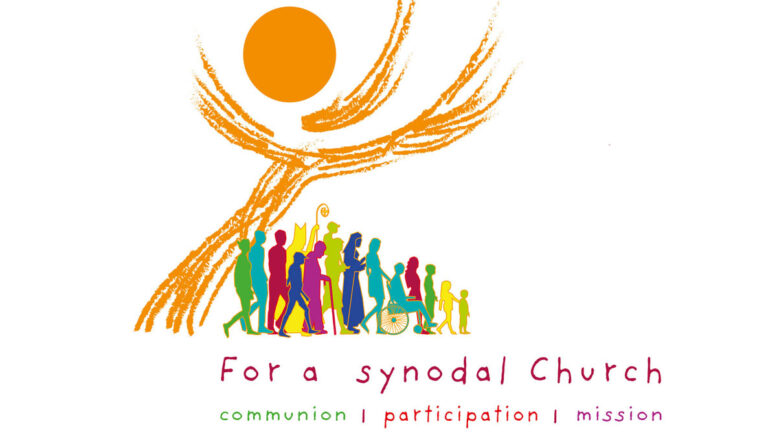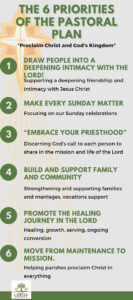Saskatoon Bishop Mark Hagemoen announced the launch of the diocese’s synod implementation phase on Sunday, Nov. 9, the Feast of the Dedication of the Lateran Bascilica. (PDF of Bishop’s Letter – LINK)
“Synodality is NOT a program or method, but rather a way of being Church… and therefore it calls us all to conversion because it entails a change of mindset and a way of being Church together.” – Summary about Synod Implementation in the Diocese – LINK
More resources about the Synod on Synodality – rcdos.ca/synod
By Bishop Mark Hagemoen, Roman Catholic Diocese of Saskatoon
Do you not know that you are God’s temple and that God’s Spirit dwells in you? – (I Corinthians 3:16)
Dear Sisters and Brothers of the Diocese of Saskatoon:
This year of the Jubilee Pilgrimage of Hope has seen the death of Pope Francis and the election of Pope Leo XIV. One pope started us on this pilgrimage journey of hope – which also features the call to be a more synodal church. And now Pope Leo has confirmed this call and work. At a recent Jubilee of Synodal Teams, Pope Leo said that synodality will “help the church fulfill its primary role in the world, which is to be missionary, to announce the Gospel, to give witness to the person of Jesus Christ in every part of the world, to the ends of the earth.”
This is, of course the mission of the Church at every level, and in every setting! Synodality is indeed a way of walking our journey of missionary discipleship in unity with Jesus Christ, inspired and led by the Holy Spirit. In this walk, we are inspired by the Synod on Synodality that has listened in the Spirit to the voices of people from around the world over a multi-year process of discernment. The Final Document released by the Synod of Bishops calls for intentional focus and an ongoing journey of conversion to become a more synodal church of communion, participation and mission – and the Holy Father is now asking dioceses around the world to implement this synodal vision.
Thus, I am pleased as your bishop to announced the “implementation phase” of the synodal process for the Roman Catholic Diocese of Saskatoon. Our implementation phase will feature the following:
- Firstly, we will continue the conversations in the Spirit that have happened to date at the local and diocesan levels about the meaning and practical features of synodality.
- Secondly, we will link the implementation features of synodality to our Diocesan Pastoral Plan. We have put a lot of prayer, discernment, and work into this plan – which has been a source of renewal and focus for all of our diocese. However, the pastoral plan can be greatly improved by being infused with the spirit of synodality – just as the Beatitudes (see Mathew 5: 1-16) bring life and character to living out of the Gospel.
- Thirdly, as we conclude the Jubilee Year of Hope, we also look to another coming great event: The 2000th anniversary in 2033 of the Resurrection of Christ and the Great Commission. What a remarkable and unprecedented opportunity for the celebration of the very reason for our hope, and the basis for mission. I pray this upcoming time will be a real time of deepening conversion for all of us called to the mission of Jesus Christ to save and bless His people.
- Fourthly, this implementation phase is being announced for our diocese on the Feast of the Dedication of John Lateran Basilica – a day when the Church celebrates the great temple and Pope’s cathedral church as the mother church for all the world. It is also a day when we are reminded – as missionary disciples of the Lord Jesus Christ – of His call to us all to be His temples in and for the world. As St. Caesarius of Arles, bishop, states, “…we are to be the true and living temple of God… let the light of good works shine in us … God wishes to enter in to our souls, for He promised: I shall live in them, and I shall walk the corridors of their hearts.”
May our synod implementation plan help each of us to be better temples of the life of God – within ourselves – and for our parishes, diocese and larger communities. May we approach the synod implementation phase not as another task or plan to be accomplished, but as a real time of patient listening to the Holy Spirit, who calls us to a new and greater awareness of not only the goal and destination, but also the journey along the way.
I conclude with this inspiration from St. Mother Teresa – who is a great teacher about the synodal features of empathy and attentive listening: “We are called to be contemplatives in the heart of the world by seeking the face of God in everything, everyone, everywhere, all the time, and His hand in every happening.” (St Teresa of Calcutta)
Sincerely, in Christ,
Most Reverend Mark A. Hagemoen, Bishop of Saskatoon
SUMMARY: “PATHWAYS FOR THE IMPLEMENTATION OF THE SYNOD IN THE DIOCESE”
“A SYNODAL WAY of Proclaiming Christ and God’s Kingdom Today”
Background about the implementation phase of the Synod on Synodality in the Roman Catholic Diocese of Saskatoon – Nov. 9, 2025:
In communion with the Holy Father Pope Leo XIV and the universal Catholic Church, Bishop Mark Hagemoen is officially launching the implementation phase of our diocese’s synodal journey on Sunday, Nov. 9, 2025. The guiding document for this phase of the Synod on Synodality is the Final Document from the Second Session of the 16th Assembly ( “For a Synodal Church: Communion, Participation, Mission” – FD) along with the supporting document, Pathways for the Implementation Phase of the Synod.
Synodality is NOT a program or method, but rather a way of being Church ‘modus vivendi et operandi’ (FD #30) and part of “…her proper identity” ( FD#31), and therefore it calls us all to conversion because it entails a change of mindset and a way of being Church together (FD #33)
In deepening synodality in the life of our diocese, our parishes, and among all the baptized, our diocesan pathway will include:
- Continuing to reflect upon – and practice – the Conversations in the Spirit from the synodal listening sessions held throughout our diocese and the whole world during the Synod on Synodality 2021-2024.
- Proceeding with the ongoing implementation of our Diocesan Pastoral Plan to “Proclaim Christ and God’s Kingdom Today” by intentionally focusing on our priorities and goals through the lens and practice of synodality.
- Finding renewed ways to come together to pray, discern, listen to the Holy Spirit and listen to one another as we seek some practical ways to make the existing programs and structures more synodal in practice and in approach.
“The synodal form of the Church is at the service of its mission, and any change in the life of the Church is intended to make it more capable of proclaiming the Kingdom of God and witnessing to the Gospel of the Lord to the men and women of our time.” – Cardinal Mario Grech, Pathways for the Implementation Phase of the Synod.
The supporting resource Pathways for the Implementation Phase of the Synod provides a framework for our diocese to reflect on and implement pastoral strategies, that emphasize: exploring the Gospel, ways of sharing our faith, and creating more synodal practices. This would include: exploring decision-making and governance structures that focus on the church’s mission; broader sharing of ideas and experiences that emphasize evangelization and mission; pursuing formation in listening and accompaniment; and developing strategies at the parish level that include synodality and listening that enhance and create “communion, participation, and mission.” The process is also supported by a timeline (including an evaluation process) with a view to a larger ecclesial assembly in October 2028.
Key implementation pathways:
- Discerning ways of Ministry and Service: We commit to exploring and developing ways of discernment that contribute to good decision-making, include listening to each other, and working together in parishes and dioceses, grounded in the Word of God and attentive to the Holy Spirit. This includes exploring and developing forms of service and ministry that respond to pastoral needs.
- The Focus on Mission: We will strive to ensure that structural changes help the Church better serve the local context and the world in sharing the Gospel message of hope.
- Sharing Ideas: Parishes will be encouraged to engage with and learn from each other’s challenges and accomplishments through the exchange of ideas, resources, and
- Impacting and Renewing Personal and Communal Life: The goal is to undertake concrete developments and changes that affect people’s everyday lives in the parish, rather than only writing theoretical plans. This involves the renewal of parishes in a synodal way, grounded in listening, belonging, and a missionary spirit.
Support and accountability
- Participatory Bodies: Ensuring that the diocesan and parish leadership and ministry bodies are reflecting on their own operating methods, and that these are renewed in a synodal way.
- Bishop’s Role: The diocesan bishop is entrusted with the ecclesial leadership responsibility for initiating, guiding, and concluding the implementation phase within the diocese.
- Related Formation and Skills: Forming people in listening, discernment, and facilitation skills to support ongoing listening and conversation.
- Widely Participatory: Engage with a wide range of people, including those on the margins and those who may not have been fully involved.
- Evaluation: The process is structured to include ‘evaluation assemblies’ at the diocesan level in the first half of 2027, and at the continental level in the first half of 2028.
Materials and updates related to the diocese’s implementation phase will be available at: rcdos.ca/synod.


